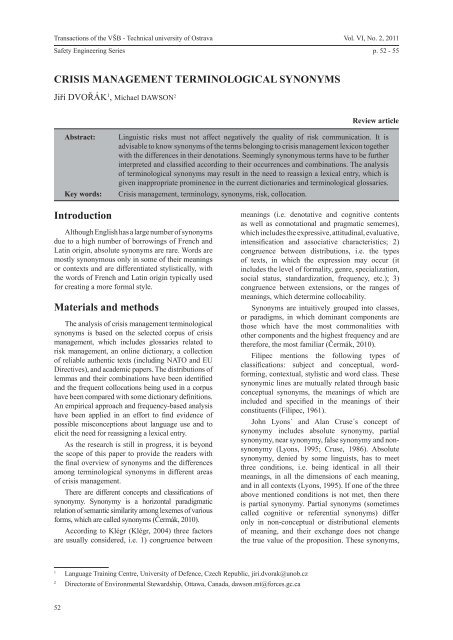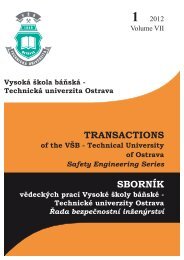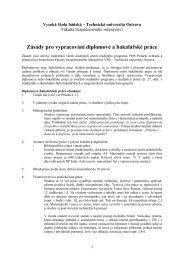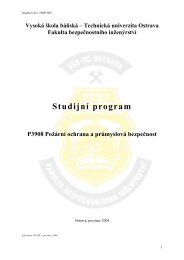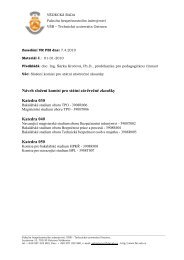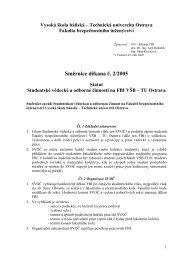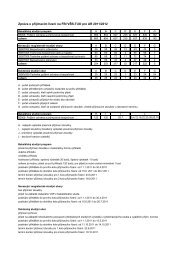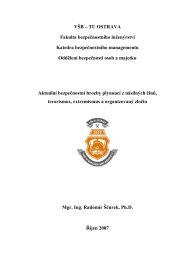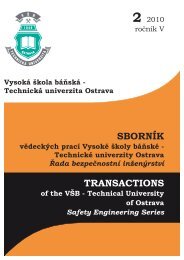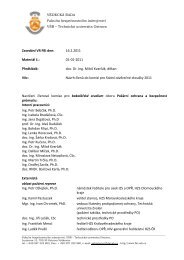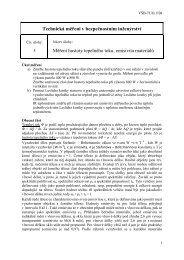Transactions - FBI - Vysoká Å¡kola báÅská - Technická univerzita ...
Transactions - FBI - Vysoká Å¡kola báÅská - Technická univerzita ...
Transactions - FBI - Vysoká Å¡kola báÅská - Technická univerzita ...
You also want an ePaper? Increase the reach of your titles
YUMPU automatically turns print PDFs into web optimized ePapers that Google loves.
<strong>Transactions</strong> of the VŠB - Technical university of OstravaSafety Engineering SeriesVol. VI, No. 2, 2011p. 52 - 55CRISIS MANAGEMENT TERMINOLOGICAL SYNONYMSJiří DVOŘÁK 1 , Michael DAWSON 2Review articleAbstract:Key words:Linguistic risks must not affect negatively the quality of risk communication. It isadvisable to know synonyms of the terms belonging to crisis management lexicon togetherwith the differences in their denotations. Seemingly synonymous terms have to be furtherinterpreted and classified according to their occurrences and combinations. The analysisof terminological synonyms may result in the need to reassign a lexical entry, which isgiven inappropriate prominence in the current dictionaries and terminological glossaries.Crisis management, terminology, synonyms, risk, collocation.IntroductionAlthough English has a large number of synonymsdue to a high number of borrowings of French andLatin origin, absolute synonyms are rare. Words aremostly synonymous only in some of their meaningsor contexts and are differentiated stylistically, withthe words of French and Latin origin typically usedfor creating a more formal style.Materials and methodsThe analysis of crisis management terminologicalsynonyms is based on the selected corpus of crisismanagement, which includes glossaries related torisk management, an online dictionary, a collectionof reliable authentic texts (including NATO and EUDirectives), and academic papers. The distributions oflemmas and their combinations have been identifiedand the frequent collocations being used in a corpushave been compared with some dictionary definitions.An empirical approach and frequency-based analysishave been applied in an effort to find evidence ofpossible misconceptions about language use and toelicit the need for reassigning a lexical entry.As the research is still in progress, it is beyondthe scope of this paper to provide the readers withthe final overview of synonyms and the differencesamong terminological synonyms in different areasof crisis management.There are different concepts and classifications ofsynonymy. Synonymy is a horizontal paradigmaticrelation of semantic similarity among lexemes of variousforms, which are called synonyms (Čermák, 2010).According to Klégr (Klégr, 2004) three factorsare usually considered, i.e. 1) congruence betweenmeanings (i.e. denotative and cognitive contentsas well as connotational and pragmatic sememes),which includes the expressive, attitudinal, evaluative,intensification and associative characteristics; 2)congruence between distributions, i.e. the typesof texts, in which the expression may occur (itincludes the level of formality, genre, specialization,social status, standardization, frequency, etc.); 3)congruence between extensions, or the ranges ofmeanings, which determine collocability.Synonyms are intuitively grouped into classes,or paradigms, in which dominant components arethose which have the most commonalities withother components and the highest frequency and aretherefore, the most familiar (Čermák, 2010).Filipec mentions the following types ofclassifications: subject and conceptual, wordforming,contextual, stylistic and word class. Thesesynonymic lines are mutually related through basicconceptual synonyms, the meanings of which areincluded and specified in the meanings of theirconstituents (Filipec, 1961).John Lyons´ and Alan Cruse´s concept ofsynonymy includes absolute synonymy, partialsynonymy, near synonymy, false synonymy and nonsynonymy(Lyons, 1995; Cruse, 1986). Absolutesynonymy, denied by some linguists, has to meetthree conditions, i.e. being identical in all theirmeanings, in all the dimensions of each meaning,and in all contexts (Lyons, 1995). If one of the threeabove mentioned conditions is not met, then thereis partial synonymy. Partial synonyms (sometimescalled cognitive or referential synonyms) differonly in non-conceptual or distributional elementsof meaning, and their exchange does not changethe true value of the proposition. These synonyms,1Language Training Centre, University of Defence, Czech Republic, jiri.dvorak@unob.cz2Directorate of Environmental Stewardship, Ottawa, Canada, dawson.mt@forces.gc.ca52


